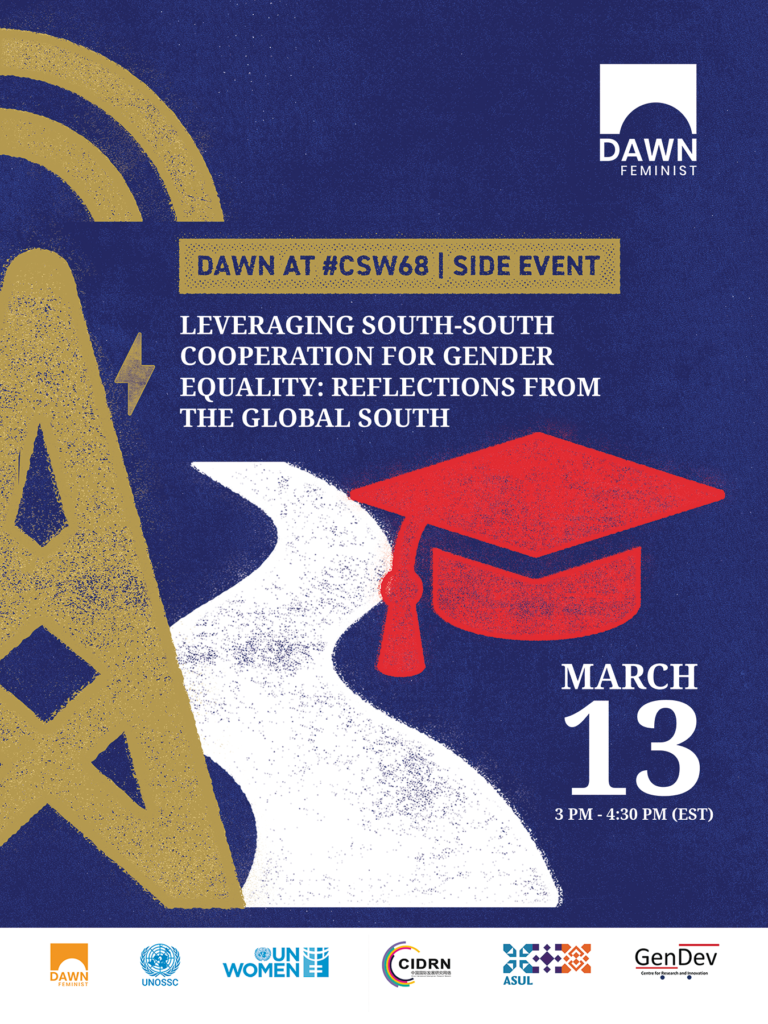What are the challenges and opportunities in integrating gender perspectives into the South-South and triangular cooperation (SSTC) programmes for gender equality and women’s rights?
On March 13th, 2024, DAWN and its co-sponsors hosted the panel “Leveraging South-South Cooperation for Gender Equality: Reflections from the Global South” at the 68th Session of the Commission on the Status of Women.
The side event was co-sponsored by Development Alternatives with Women for a New Era (DAWN), UNOSSC, the United Nations Entity for Gender Equality and the Empowerment of Women (UN Women), South-South Cooperation Research and Policy Centre (Articulação Sul/ASUL), China International Development Research Network (CIDRN), and GenDev Centre for Research and Innovation (GenDev CRI).
The panel promoted a rich dialogue with feminist scholars, women’s human rights activists, policymakers, and development practitioners about issues of sustainable development, women’s human rights, and gender equality in the context of strengthening South-South and triangular cooperation to accelerate the implementation of the Beijing Platform for Action (BPfA) and the Sustainable Development Goals (SDGs).
“By fostering partnerships and exchanging knowledge, the Global South can create innovative frameworks and policies that promote gender equality and empower women,” said UNOSSC Director Dima Al-Khatib. Her address opened up the discussions in a full room at the UNOSCC office in New York.
“As we navigate the complex terrain of development with the Global South, it is imperative that we recognise the power of collaboration, particularly through South-South and triangular cooperation, to drive transformative change together,” said Kanta Singh, Deputy Representative of UN Women India.











“As South-South cooperation practice evolves into its next phase and engages various actors beyond the state, more than ever, women’s leadership and active participation, including that of women’s rights and feminist organisations, at all levels and in all stages of the South-South cooperation practices, are key to achieve the gender equality and sustainable development goals, and to address the persistent and new challenges such as women’s land rights, peace and security, and digital technology,” said moderator Cai Yiping of DAWN, China.
Other speakers included: Annita Montoute (The University of the West Indies, Trinidad and Tobago); Diana Castro (Latinoamérica Sustentable, Ecuador); Govind Kelkar (GenDev CRI, India); Laura Trajber Waisbich (University of Oxford, UK/ASUL, Brazil), Li Yingtao (Beijing Foreign Studies University, China), Lord Mayor Rohey Malick Lowe(Banjul, The Gambia); and Zhang Chuanhong (China Agricultural University, China.

“Gender equality is woven into the fabric of the South-South Cooperation Trust Funds and Programmes managed by UNOSSC, exemplified by results achieved in improving women’s economic, social and political leadership and participation; education and skills training for girls; and mainstreaming gender in programme design and results management,” said Xiaojun Grace Wang, UNOSSC Trust Fund Director, in her concluding remarks.
“We must remind ourselves that gender equality is not just an aspiration, it should be an achievable reality, demanding all our collaborative efforts across countries, institutions, and individuals in the spirit of equal partnership.”
Over 150 feminist scholars, women’s human rights activists, policymakers, and development practitioners participated in the event.
